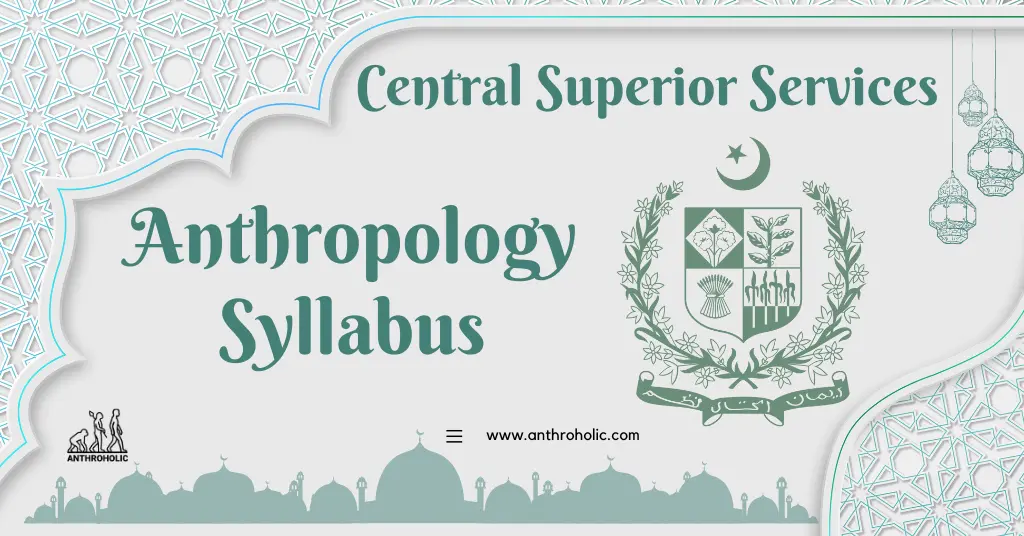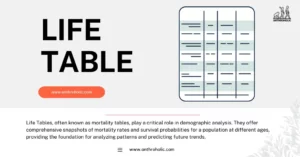AI Answer Evaluation Platform Live Now. Try Free Answer Evaluation Now
CSS Anthropology Syllabus
Explore the CSS Anthropology syllabus, encompassing cultural, social, and human aspects. Gain insights into diverse societies and enhance your understanding of human behavior for the Central Superior Services exam preparation.
The Central Superior Services (CSS) exam is a competitive examination conducted in Pakistan to select individuals for various prestigious civil service positions within the federal government. Administered by the Federal Public Service Commission (FPSC), the CSS exam aims to identify candidates with the aptitude, skills, and knowledge necessary to serve in key administrative, policymaking, and managerial roles across different government departments.

The CSS exam is highly regarded for its rigorous selection process and comprehensive evaluation of candidates’ intellectual abilities, general knowledge, and analytical thinking. It encompasses a wide range of subjects, including English, Pakistan Affairs, Current Affairs, Islamic Studies, and optional subjects chosen by candidates based on their areas of expertise or interest. The examination process consists of written tests followed by interviews.
Successful candidates who pass the CSS exam are offered appointments in various occupational groups, such as the Pakistan Administrative Service (PAS), Police Service of Pakistan (PSP), Foreign Service of Pakistan (FSP), and more. These civil service positions provide opportunities for individuals to contribute to the country’s governance, policy formulation, and public service delivery.The CSS exam plays a vital role in shaping Pakistan’s bureaucracy and administrative structure, ensuring the selection of capable individuals who can navigate the complexities of governance and contribute positively to the nation’s development and progress.
I. Anthropology
II. Social Anthropology
- Definition of culture, its characteristics and functions
- Relationship of anthropology with other social sciences
- Sub fields of anthropology:
- Institution of Family and Marriage
- Kinship and Social Organization
- (Definitions, types, functions, kinship terminology etc)
- Political Organization:
- (Definitions, evolution of political system, characteristics of (band, tribal, chiefdom and state societies), theories of the origin of state societies (internal conflict theories, external conflict theories, population and irrigation theories, institutionalization of leadership and the emergence of state, system theories), origin of civilization, the politics of identity, ethnicity and ethnic relations, nationalism, modernism, post-modernism etc.
- Religion:
- (Definitions, evolution of primitive religions, functions of religion, comparison of devine religions and other world religions such as Hinduism, Buddhism, Jainism etc)
- Contemporary Human Problems:
- Poverty, social inequality, political instability, population problems, ethnic violence and terrorism etc.
III. Urban Anthropology
Rural-urban migration, expansion of cities, major environmental issues, sanitation problems, urbanization and development, establishment of slums and squatter settlements, refugees, yankees, betties, gypsies, wars and conflict, conversion of power from feudal to industrialists, institutionalization, education system, and change in the mode of production (agriculture to capitalists), poverty (theories and remedies), management of city life (psychological, cultural, economic, political, religious, physical, environmental, ecological, demographical, lingual etc.), Karl Marx and conflict theory, problems created by the mechanization and automation.
IV. Socio-Cultural Change
Definitions, difference between social and cultural change, various dimension of cultural change, barriers to cultural change including (culture, psychological and political), internal dynamics for change, external dynamics for change, population incease and change, diffusion of innovations, socio-religious barriers in accepting the innovations and new ideas, media and cultural change, dynamics of change in Pakistan (Trends and prospects)
V. Ethnicity and Race
Theories related to ethnicity and race, ethnicity and racism, nations and nationality, ethnic conflict, degree of social variation, rank societies, caste and class societies and social stratification etc.
VI. Anthropological Theories
- Contributors: (Edward Burnett Taylor, Lewis Henry Morgan, James Frazer, Karl Marx, Edmund Leach, Franz Boas, Margaret Mead, Ruth Benedict, Alfred L. Krobber, Alfred Reginald Radcliffe-Brown, Bronislaw Kasper Malinowski, Clifford Geertz, Talal Asad, Akbar S. Ahamd, Ibn Khaldun, Shah Walliullah).
- Classical Theories: (Degenerations, Evolutionism, Neo-Evolutionism, Diffusions)
- Modern Theories: (Functionalism, Structural-functionalism, Class struggle, Structuralism, Historical Particularism, Feminism, Culture and personality)
- Current Trends in Anthropological Thoughts: (Post Modernism, Romanticism, Poetics and Politics of Ethnography)
VII. Anthropological Research Methods
- Meaning, definition, types and aims of anthropological research
- Qualitative and Quantitative research
- Purpose of research, research question, variables, hypothesis, research objective(s), research design, sampling, field data collection, tools of data collection (questionnaire, interview, participant observation), data classification, data analysis, and reporting.



